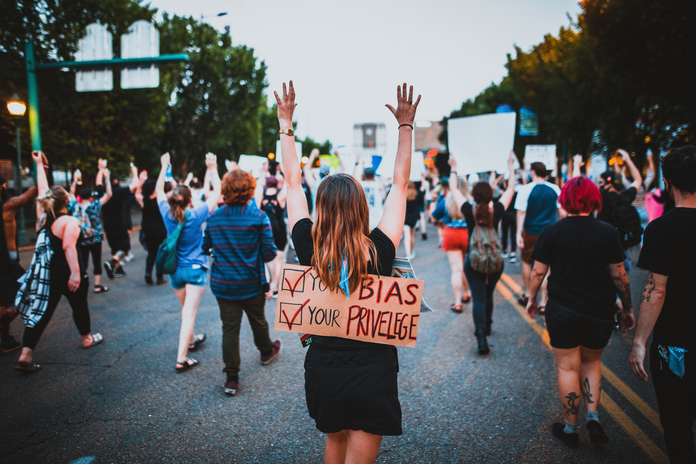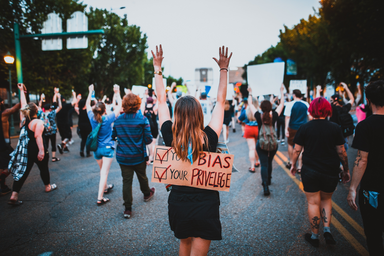Gender biases in colleges are becoming prominent more than ever despite constant fighting for equality of all genders. Men are far less likely to be punished or face any consequences for criticism of professors, class content, grading, work load, etc. compared to their non men counterparts. This extends past criticism to direct remarks about the professors as people, as well. The following scenarios showcase gender biases that are present in colleges around the country. These instances cultivate a learning environment that favors men and neglects students who are not men.
In one instance, a male student commented on a female professor’s appearance in a class group chat, saying she was “a milf”. (For those who don’t know, ‘milf’ is an acronym for Mom I’d Like to F***.) Many other students of all genders immediately agreed, and continued the commentary about the professor’s appearance. No one confronted the student who initiated the conversation, or those that followed — and the comment was never brought to the professor’s attention.
In a similar situation, a female student commented on a female professor’s appearance in a class group chat, saying “she could get it”. A handful of other female students agreed that the professor was attractive, and some male students agreed as well. However, another female student immediately confronted the student who made the comment and those who agreed, saying that it is difficult for women to be in positions of power because they are often viewed in a sexual manner or only based on their appearance.
While I do not believe anyone should be judged solely by their appearance or talked about in this manner, I do believe the different treatment of the male student not being confronted for making a comment, and the female student being immediately confronted for making a very similar comment showcases how, not only professors, but students have implicit gender biases.
In another instance, a male student commented in a group chat about how a male professor with an accent was difficult to understand. However, the comment wasn’t stated as such, it was aggressive and intended to be harmful — a clearly xenophobic remark. Some people agreed with the student’s hateful remarks, but another student almost immediately came to the defense of the professor. This other student confronted the original student, saying that his comment was rude and unnecessary, and that the professor was trying his best to teach them all.
In a similar instance, a male student commented in a group chat about how a female professor with an accent was difficult to understand. This comment was asserted in a more aggressive and hateful manner, and was clearly xenophobic. Unlike the last instance, no one confronted the student who made these remarks: rather they agreed with him. Many blamed her accent for their poor grades in the class.
People who are viewed as having accents, professors or otherwise, are no less professional and no less educated than someone who is viewed as not having an accent. I do not agree with any of these remarks, but it showcases how male professors are immediately defended while their female counterparts are scrutinized. Male professors are described as hardworking and persevering by students, while female professors are further berated with hateful and rude comments.
In yet another instance, a male student commented in a group chat that the amount of work a professor was assigning over a break was “bullsh*t”. Many other students agreed, using equally, if not more, vulgar language to describe their dissatisfaction. The comments were never brought to the attention of the professor and were left alone.
In a similar instance, a female student commented in a group chat that the amount of work assigned by a professor over a break was “bullsh*t”. Many other female students agreed with the remark (and male, however the class was predominantly women), expressing their own dissatisfaction with the workload. The comments were brought to the male professor, who then threatened to fail the female students who made the comments for expressing their dissatisfaction.
These instances showcase not only how male students are allowed to express their distaste for a professor or a class while their female student counterparts are not, but it also showcases how male professors will abuse their power against female students and not male students. Women are expected to be silent and submissive to men, and when a male professor encountered female students who were not silent and submissive, he immediately threatened them with their grades.
Another instance similar to the previous one occured when a male professor informed a class that they were expected to not excel on his exams, and should be satisfied with an average grade of a 2.5 on them ( 68%). A male student and a female student separately emailed the professor, expressing the same concerns that they were not being effectively tested for what they learned given the complexity of the questions compared to the material and the lack of time they received to complete the exams. The professor sent a lengthy email back to the male student, explaining to him why the exams are more complex and how that applied to exams conducted in the past. The professor sent a shorter email back to the female student, telling her that she was “lucky” he was giving the class as much time as he was and that it shouldn’t take the whole time if one understands the content.
The response to the male student was explanatory, informative, and calm, while the response to the female student was snarky and alluded to her inability to understand the material. This showcases another example of a male professor using his power to berate female students for addressing the same concerns as male students.
In many of these cases, students brought their concerns of gender bias from professors to the dean of that college, to no avail. Many of their concerns were dismissed or ignored altogether. This shows that the gender biases go beyond students and professors and spills into higher authority in colleges.
All of these instances show that gender bias in colleges is prevalent among different subjects, professors and schools, but it is something that needs to be acknowledged, addressed, and fixed. It is unjust for female students to be berated by other students. It is unjust for female professors to be berated by students, and it is unjust for female students to be berated by [male] professors. Learning environments should be safe spaces. Students should not fear that they cannot address concerns or express opinions without being attacked by peers or professors. This breeds an environment where non-men feel they are not cared about by universities, which impacts their learning. Meanwhile, male students are held to lower standards and are allowed to thrive. Students, professors, and colleges as a whole need to be held accountable for gender biased actions, or else there will never be a learning environment where students who aren’t men can feel safe.


